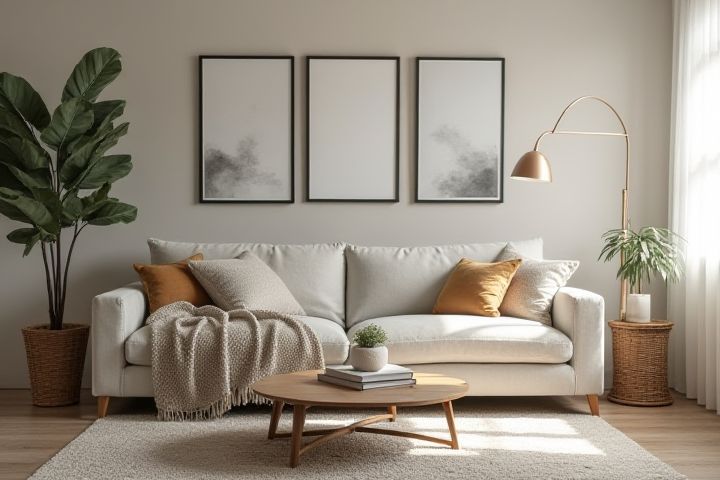
House staging is the process of professionally preparing a home for sale to enhance its appeal to potential buyers. This involves decluttering, depersonalizing, and strategically arranging furniture to create a welcoming atmosphere. Professional stagers often use neutral colors and effective lighting to highlight the property's best features. By creating a visually appealing environment, sellers can increase the perceived value of their home and potentially reduce its time on the market. Investing in staging can lead to higher offers and a successful sale in today's competitive real estate landscape.
What Is House Staging
Enhances property appeal
House staging enhances property appeal by transforming spaces to captivate potential buyers' interests. By decluttering, rearranging furniture, and utilizing strategic color schemes, staged homes can showcase a property's best features, increasing perceived value. Studies indicate that staged homes sell 73% faster and often for 10% more than non-staged counterparts. Investing typically ranges from 1% to 3% of the home's value, making it a cost-effective strategy to boost selling success.
Highlights space functionality
Home staging emphasizes the effective use of space, transforming areas to showcase their potential and functionality. By strategically arranging furniture and decor, you can create a welcoming atmosphere that appeals to potential buyers. For instance, an open-concept living area can be staged with cozy seating and clear pathways, demonstrating how various zones can be utilized. Ultimately, successful staging can increase your home's market value by up to 10%, making it an essential step in the selling process.
Increases market value
House staging focuses on enhancing the property's appeal to potential buyers, thereby increasing its market value. By optimizing furniture arrangement, color schemes, and decor, staging creates a welcoming atmosphere that allows buyers to envision themselves in the space. Highlighting the home's best features, such as open layouts or natural light, can make it more attractive compared to non-staged homes. You can expect a well-staged property to sell faster and often at higher prices, making it a valuable investment for sellers.
Shortens selling time
Home staging effectively shortens selling time by enhancing a property's visual appeal, making it more attractive to potential buyers. Studies indicate that staged homes can sell up to 73% faster than non-staged counterparts. By strategically arranging furniture and decor, you can help buyers envision themselves in the space, which leads to quicker offers. In fact, investing as little as 1% of the home's value in staging can yield a return of 5 to 15 times that amount during the sale.
Attracts potential buyers
House staging focuses on enhancing a property's appeal to attract potential buyers. Key elements include decluttering, neutralizing colors, and strategically arranging furniture to highlight the home's best features. Studies show that staged homes can sell up to 73% faster than non-staged ones, making it a smart investment. Your goal is to create an inviting atmosphere that allows buyers to envision themselves living in the space.
Utilizes neutral decor
House staging focuses on utilizing neutral decor to create an inviting and versatile environment that appeals to a broad range of potential buyers. By employing shades like beige, gray, and soft whites, it fosters a blank canvas that allows viewers to envision their own style and furniture in the space. This strategy can enhance the perceived size of rooms, making them feel more open and airy, which is crucial in attracting offers. Professional staging often highlights key features of the property while minimizing distractions, allowing properties to sell 73% faster compared to non-staged homes.
Emphasizes home's strengths
House staging emphasizes your home's strengths by showcasing architectural features and maximizing visual appeal. Strategic furniture placement and tasteful decor create an inviting atmosphere that resonates with potential buyers. According to real estate experts, staged homes can sell for 10% to 20% more than non-staged homes, highlighting the financial benefits. Presenting a clean, well-organized space allows buyers to envision their lives within the home, ultimately increasing the chances of a quicker sale.
Depersonalizes space
House staging primarily focuses on depersonalizing space to create an inviting environment for potential buyers. By removing personal items such as family photos and unique decor, the property becomes a blank canvas that allows visitors to envision their own lives within the space. This strategy enhances the overall presentation, making it easier for prospects to see the home as a possibility, rather than as someone else's residence. Research indicates that staged homes can sell 73% faster and may garner up to 20% higher offers than non-staged properties.
Professional staging services
Professional house staging services enhance a property's appeal by utilizing strategic furniture placement and decor to create an inviting atmosphere. These services typically involve a thorough assessment of your home's layout, resulting in tailored staging solutions that highlight its best features. Statistics show that homes with professional staging spend 73% less time on the market compared to non-staged homes. By employing a skilled stager, your property can attract a broader range of potential buyers, ultimately increasing its market value and likelihood of sale.
Cost-effective investment
House staging is a cost-effective investment that enhances property appeal, often yielding a return on investment of 10% to 15% at sale. By investing an average of 1% of your home's value in staging, you can attract more buyers and potentially sell your home 73% faster. Key staging strategies include decluttering, optimizing furniture arrangement, and using neutral color palettes to create inviting spaces. Successful staging not only highlights your home's strengths but also helps prospective buyers visualize themselves in the property, increasing the likelihood of a sale.
